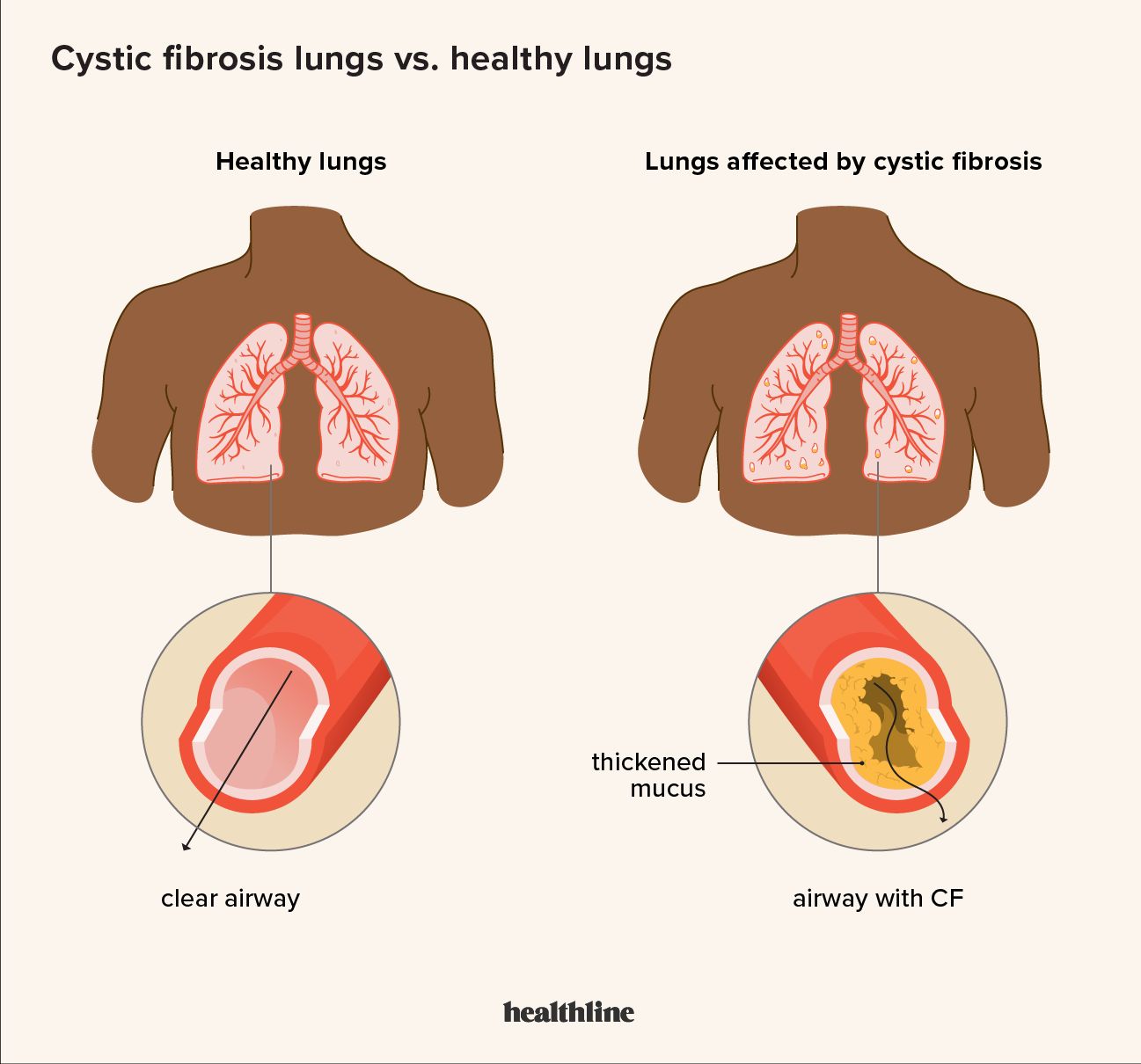Cystic fibrosis affects many parts of the body, but its effects on the lungs can be especially harmful.
Cystic fibrosis is a chronic and progressive condition that causes the mucus in your lungs to be sticky and thick.
This makes it hard to breathe and leads to symptoms such as coughing and wheezing. It also causes bacteria to get trapped in the lungs, leading to infection and inflammation. These infections can be serious and lead to lung damage over time.
Treatment can’t cure cystic fibrosis, but it can help reduce the severity of lung symptoms. Options include antibiotics, medications to clear airways, supplemental oxygen, and chest physical therapy.
Cystic fibrosis causes the mucus in your lungs to be overly sticky and thick. Since this mucus is so thick, it makes it harder to clear your lungs. This can make everyday breathing difficult. It causes mucus to fill up the windpipe, or trachea, several times a day. It also causes chronic coughing or wheezing that is often associated with cystic fibrosis.
Bacteria may get stuck in the sticky and thick mucus and can lead to infection. An infection can cause inflammation, which can cause the production of an even stickier mucus. Often, this means that infections that are minor and harmless for people without cystic fibrosis can be severe for people with cystic fibrosis.
People with cystic fibrosis might need to stay in the hospital for the duration of these infections to receive IV (intravenous) antibiotics and be monitored by healthcare professionals. Additionally, the lungs can become damaged by repeated infection and inflammation.
If you have a lung infection with cystic fibrosis, you may have symptoms such as:
- chest pain
- increased coughing
- increased production of mucus
- a change to the color of your mucus
- reduced lung function
- breathlessness
- fatigue
- loss of appetite
- unintentional weight loss
What does a cystic fibrosis cough sound like?
People with cystic fibrosis can have labored breath sounds throughout the day. Coughing typically sounds wet and similar to when someone has a chest cold or infection.
People with cystic fibrosis often also experience breathing sounds such as high-pitched whistling sounds (wheezing), cracking or bubbling sounds (rales), and squeaking sounds on each breath (stridor).
There are multiple treatments to help treat the effect of cystic fibrosis on your lungs. This can include:
- Antibiotics: Antibiotics can help fight the bacteria that get stuck in lung mucus and cause infection in people with cystic fibrosis. There are IV, aerosolized (inhaled), and oral versions of many antibiotics, allowing for flexibility and outpatient treatment. However, long-term antibiotic use can lead to the development of antibiotic-resistant bacteria.
- Medications to reduce inflammation: There are a variety of medications that can help keep your airways clear by reducing inflammation. This often includes steroid inhalers and nonsteroidal anti-inflammatory drugs (NSAIDs).
- Bronchodilators: Bronchodilators, such as albuterol, help make breathing easier by relaxing the muscles of your airways.
- Mucus-thinning medications: Medications that help thin your mucus can make it easier to manage.
- Chest physical therapy: Chest physical therapy helps to physically remove mucus from your lungs. There are several techniques for chest physical therapy, but it is generally done while you lie in a position that helps drain mucus. While you are in this position, your chest is gently clapped or banged on to move the mucus.
- Oxygen therapy: Supplemental oxygen can help some people with cystic fibrosis get the oxygen their body needs.
- Lung transplants: Sometimes, lung transplants can be beneficial for people with cystic fibrosis.
Cystic fibrosis is a chronic and progressive condition with no cure. Until recently, people with cystic fibrosis rarely lived past their teenage years. However, new treatments and screenings for earlier diagnosis are helping change the outlook for people with cystic fibrosis.
Today, people with cystic fibrosis are living decades longer than ever before.
People with cystic fibrosis born between 2018 and 2022 are predicted to live to an average age of 56, and it’s predicted that over half of people with cystic fibrosis born in 2021 will reach the age of 65. Of course, these are estimates that represent wider trends. Your individual life expectancy will depend on a variety of factors.
Your doctor can help you understand your outlook and how your cystic fibrosis might progress over time.
Cystic fibrosis causes the mucus of your lungs to be too sticky and thick to function normally. As a result, people who have cystic fibrosis have breathing difficulties.
They typically have labored breathing and a chronic cough and need to clear mucus buildup from their trachea throughout the day. This mucus also puts people with cystic fibrosis at risk of lung infections. These infections are often significantly more serious than they would be for people without cystic fibrosis. They can also lead to inflammation, which can damage the lungs over time.
There’s no cure for cystic fibrosis, but treatment can help manage symptoms. Primary treatment options include antibiotics to reduce and control infections, medications to keep airways clear, and chest physical therapy to remove mucus from the airways. Sometimes, treatments such as supplemental oxygen or a lung transplant can also be options.

